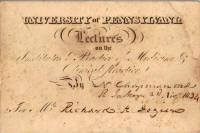Nathaniel Chapman, M.D.
Lecture tickets for Nathaniel Chapman
Nathaniel Chapman (28 May 1780 – 1 July 1853) was a well-known early American physician.
Chapman was born in Summer Hill, Fairfax County, Virginia. He received his early education in six years at the classical academy of Alexandria. He later attended two colleges for a short time, before moving to Philadelphia in 1797, where he began studying under Benjamin Rush and attending lectures at the University of Pennsylvania. He earned his M.D. in 1800, with a thesis on hydrophobia.
Upon his graduation, Chapman traveled to the United Kingdom in 1801, spending a year in London as a pupil of John Abernethy, and three in Edinburgh, where he attended lectures at the medical school of the University of Edinburgh. While in Edinburgh he became acquainted with a number of well-known people, including Dugald Stewart, the Earl of Buchan, and Henry Brougham.
Chapman returned to the United States in 1804, and established a medical practice in Philadelphia. He gave a private course of lectures on obstetrics in the same year, which proved so popular that, in 1806 at the age of only 26, he was elected adjunct to the Professor of Midwifery at the University of Pennsylvania, and soon thereafter was made chair of Materia Medica. He married Rebecca Biddle (daughter of Clement Biddle) in 1808. Upon the death of Benjamin Rush in 1813, he was transferred to the chair of Theory and Practice of Medicine (after Benjamin Smith Barton held the post for a brief time. Chapman gained the post in 1815.), which he would retain for nearly forty years, until his retirement in 1850. In addition to his lectures at the University of Pennsylvania, he also gave annual lectures at the Philadelphia Alms House and the Medical Institute of Philadelphia.
Among his notable activities in professional service, Chapman founded the American Journal of the Medical Sciences in 1820 and served as its editor for some years, and also served as President of both the Philadelphia Medical Society and the American Philosophical Society.
Of his published works, the most popular were Select Speeches, Forensic and Parliamentary (1804), touching on both medical and political matters, and Therapeutics (1817), a work on what was then termed materia medica that went through seven editions.
